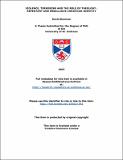Files in this item
Violence, terrorism and the role of theology : repentant and rebellious Christian identity
Item metadata
| dc.contributor.advisor | Aguilar, Mario I. | |
| dc.contributor.author | Brannan, David | |
| dc.coverage.spatial | 323 p. | en |
| dc.date.accessioned | 2007-06-01T12:01:37Z | |
| dc.date.available | 2007-06-01T12:01:37Z | |
| dc.date.issued | 2007 | |
| dc.identifier | uk.bl.ethos.551996 | |
| dc.identifier.uri | https://hdl.handle.net/10023/342 | |
| dc.description.abstract | What has come to be known within the Academy as, Identity theology, is presented in the literature as a monolithic belief system which supports and encourages terrorism and other forms of political violence. This dissertation argues that inattention to theological and social issues within the many Identity theology based groups in the US has led to a deeply flawed understanding of the relation between Identity adherents, terrorism and other political violence. Discussions about these groups in the literature are flawed and there is an imprecise understanding which has led to an inaccurate alignment of widely varied social groups with a pejorative classification that is neither descriptive of the various theologies at work, nor the social manifestations observed in these groups. Further, the research suggests that the academic community known as “Terrorism Studies” continues to contribute to the inaccurate understanding and that those inaccuracies are likely impediments to effective government policy in relation to the phenomenon known as Identity theology. The research presented here suggests that there are both theological and social distinctions, which can and should be delineated and understood by all those researching Identity groups. The research highlights four significant types or differences within what is now known as Identity theology, by highlighting the nuances between social groups including the Church of Israel, Covenant, Sword and the Arm of the Lord (CSA), Mission to Israel, KKK and Aryan Nations and suggests that a more precise understanding of the differences could lead to declining instances of violence and more openness to positive social change by those who currently follow these very different types of theological belief systems. | en |
| dc.format.extent | 1507625 bytes | |
| dc.format.mimetype | application/pdf | |
| dc.language.iso | en | en |
| dc.publisher | University of St Andrews | |
| dc.rights | Creative Commons Attribution-NonCommercial-NoDerivs 3.0 Unported | |
| dc.rights.uri | http://creativecommons.org/licenses/by-nc-nd/3.0/ | |
| dc.subject.lcc | BR526.B82 | |
| dc.subject.lcsh | Fundamentalism--United States--History--20th century | en |
| dc.subject.lcsh | Christianity--United States--20th century | en |
| dc.subject.lcsh | Violence--Religious aspects--Christianity | en |
| dc.subject.lcsh | Terrorism--Religious aspects--Christianity | en |
| dc.title | Violence, terrorism and the role of theology : repentant and rebellious Christian identity | en |
| dc.type | Thesis | en |
| dc.type.qualificationlevel | Doctoral | en |
| dc.type.qualificationname | PhD Doctor of Philosophy | en |
| dc.publisher.institution | The University of St Andrews | en |
This item appears in the following Collection(s)
Except where otherwise noted within the work, this item's licence for re-use is described as Creative Commons Attribution-NonCommercial-NoDerivs 3.0 Unported
Items in the St Andrews Research Repository are protected by copyright, with all rights reserved, unless otherwise indicated.


